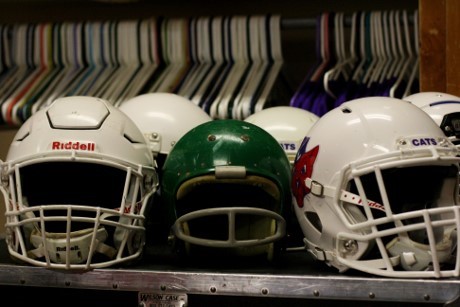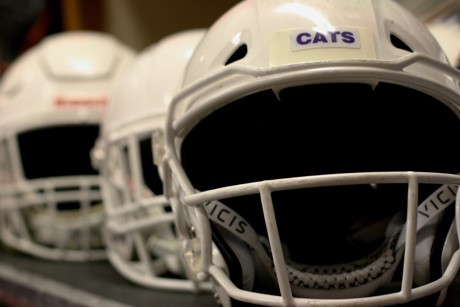Safety first, Linfield purchases $950 dollar helmets
October 30, 2018
On a Monday before practice, the usual ebb and flow of football players came into the equipment room under the Catdome stadium to say hi to equipment manager Mack Farag, grab a handful of snacks or use the room as a shortcut—which Farag frequently scolded them for.
Farag, who is in charge of managing and repairing the Linfield football equipment, sat in his usual spot behind his desk, decorated with helmets, facemasks and an assortment of tools.
He examined a hammer on his desk and picked it up—then turned to give a good whack to the helmet in his other hand.
“See?” Farag said. “It doesn’t stay dented, it pops back up.”
The helmet he whacked was the newly launched VICIS ZERO1 , which includes new technology that is supposed to protect against head injury.
The basic idea that most have about football helmets, a staple of the sport, is that they protect players’ heads. But many are unaware of the efforts that go into selecting what helmets players will wear and the helmet technology that keeps players safe—and what doesn’t keep them safe. Linfield takes every step possible to ensure player safety and it involves more than just putting on the gear.
On a large scale, the sport is under constant scrutiny for the amount of concussions that result from the impact of tacking and the long term damage it causes for football players. Linfield head athletic trainer Duane Duey said concussions occur when the head stops and the brain continues. Degenerative brain diseases were found in 99 percent of deceased NFL players, according to a 2017 study mentioned by CNBC in September.
New helmet models are constantly being created with better technology to protect against injuries.

Enter the VICIS ZERO1 helmets, created by a Seattle startup company founded in 2013. VICIS reportedly worked with University of Washington and University of Oregon to test the helmets before launching them in 2017, as described in the Seattle Times. According to VICIS, 28 of the 32 NFL teams are wearing its helmets in the 2018 season
Six of Linfield’s players are also wearing VICIS this season.
The helmet’s ability to pop back into shape instead of remain dented is just one feature that makes it stand out against others. The VICIS helmets also use suspension pads instead of air pockets to fit to players’ heads. Most helmets instead have air pockets lining the inside of the helmet, which can be inflated or deflated to fit the size of a player’s head.
Senior Duke Mackle said the customized padding creates a snug fit that is more comfortable than other helmets.
“There was a time or two that I hit my head pretty hard with my VICIS on. Felt like it saved my head a lot more compared to other helmets,” Mackle added.
The helmets are the highest rated in laboratory testing performance by the NFL and rated 5 stars by the Virginia Tech helmet rating—the two most popular rating systems. The higher ratings indicate a lower risk of concussions with the helmet.
However, with safety comes price.
One helmet is priced at $950, which is why Linfield only has six available.
“We are always trying to get the best helmets we can for our players,” said head coach Joe Smith and defensive coordinator and defensive line coach Jackson Vaughan, who are in charge of the helmet purchasing decisions. “We took a look at the VICIS helmet last year but the cost was too prohibitive and they were still just emerging on the market.”
The money to purchase these helmets primarily came from alumni donations and fundraising efforts.
Farag said the reason Linfield has the VICIS helmets is because Smith pushes for them and researches what is the best in the market. It is universal across the staff that safety is number one.
Farag described Smith as “studious” when it comes to helmet purchases.
“We do as much research as we can, talk to other people that have used the helmet, then typically try a small sample order of the product to see how much we like it before buying a large quantity of anything new,” Smith and Vaughan said.
The other two helmets available for Linfield players are the Riddell Speed and Riddell Speedflex, which are also top rated by the NFL and five star rated by Virginia Tech. These are less costly than the VICIS, with the Speed priced at $340 and the Speedflex at $400.
“We have prioritized helmet quality over everything else in terms of budget. Uniforms and other equipment take a lower priority for us,” the coaches said.
With helmets, uniform and other equipment, it can cost up to $1000 to dress one football player. With the VICIS helmets, likely more.
But as Farag said, “you gotta pay what you gotta pay for safety.” Its Linfield’s number one priority in purchasing new helmets. After that comes cost. Next comes player comfortability.
“You have to make sure the guys like it,” Farag said. Just like any piece of equipment for any sport.
And, of course, there’s the matter of looks. But like Mackle said, “looks don’t matter if it doesn’t protect your noggin.”
While the Linfield team does the most they can to get the best equipment, helmets can only do so much to protect players from concussions.

Virtually every helmet on the market is stamped with a warming that reads in capital lettering: “no helmet can prevent serious head or neck injuries a player might receive while participating in football.”
“Every medical professional knows that there’s no such thing as a concussion proof helmet,” Duey said. Duey said new technology can often have unforeseen and unintended consequences.
Duey explained a case study in which styrofoam was placed on the outside of the helmet shell to lessen the impact from head-on collisions. However, players who tested this technology came out with more neck injuries.
Another case involved placing an extra strap on the back of the neck of a player to keep him from ducking his head too low and getting injured in tackles. But the strap prevented too much movement and caused the player serious spinal injuries.
“It was a good idea in theory, but it didn’t prevent injury,” he said.
Football teams are better off learning how to tackle properly, Duey suggested.
“[Helmets] makes players feel protected, they feel like they can do things they normally wouldn’t do,” Duey said. “At the end of the day, are we really protecting them?” He pondered the idea of bringing back leather helmets because he said players might be more cautious going into tackles.
A few years back, Duey said Linfield brought in a rugby team to teach players how to tackle with their heads up instead of down.
Rugby players wear far less equipment than football. USA Rugby rules only allow a mouth guard and rugby-specific head padding—no other padding is allowed.
Linfield does more than the average college to limit the chances of getting a head injury, Farag said. Both Farag and Duey said Linfield does a good job at limiting the amount of practice days that involve live hitting, which means not tackling with 100 percent intensity.
Before coming to Linfield, Duey worked at Portland State University as the head athletic trainer. He said the school had far more injuries in practice than in games and would even hit on Sundays after Saturday games with the intention of staying “mentally and physically tough.”
“It’s refreshing to work at a place where players’ health and safety come first. Our guys are protected better,” Duey said.
Farag, back in his own football days, recalled going “live” five days a week.
“I’ve never been diagnosed with a concussion,” he said, but that’s because trainers and players weren’t looking to diagnose them. Since Farag’s football days, more concussion research has emerged and concerns have been frequently voiced like in the 2015 movie, “Concussion.”
To further reduce the risk of injury, Smith and Vaughan said there are no helmets older than five years in the inventory. The limit is 10 years, but Linfield doesn’t wait for that to come around.
Smith and Vaughan said they budget purchasing 25-30 new helmets each year. With the proven performance and comfortability of the Riddell Speed, Riddell Speedflex and the VICIS ZERO1, Farag said they will continue to add them to their inventory until something better created.
Since helmet technology is always evolving, the Linfield football staff is always looking to upgrade to keep players as safe as possible, said Smith and Vaughan.
“You can fix a hip injury, but you can’t fix a head injury,” Farag said.
